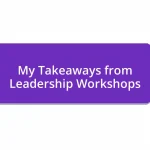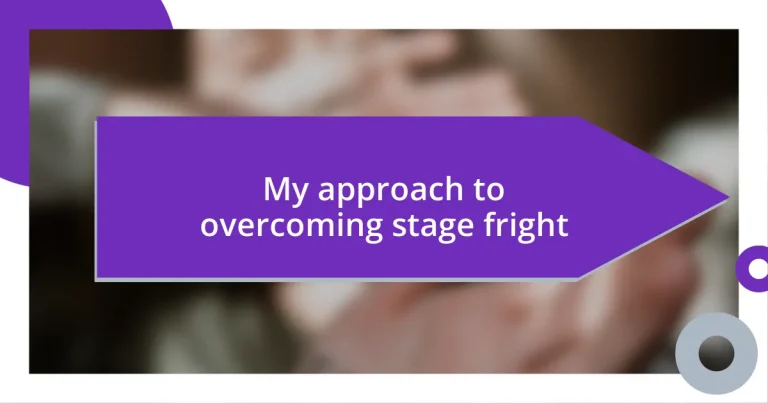Key takeaways:
- Stage fright is often rooted in fears of judgment, inadequate preparation, and physiological responses, significantly impacting performance.
- Effective anxiety management techniques include deep breathing, visualization, positive affirmations, and progressive muscle relaxation.
- Thorough rehearsal and preparation help build confidence, allowing for a more natural connection with the audience during performances.
- Seeking support from others, such as friends or support groups, can alleviate anxiety and create a sense of community among performers.
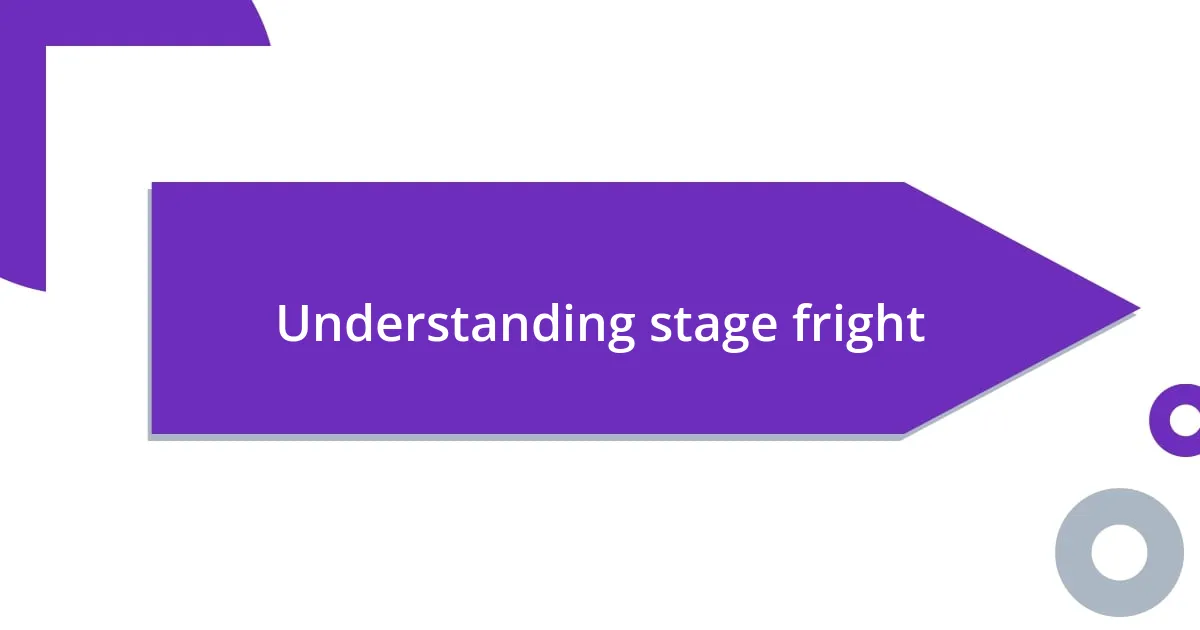
Understanding stage fright
Stage fright is a complex blend of anxiety, fear, and apprehension that grips many people before they take the spotlight. I still remember my first public speaking experience; the moment I stepped onto the stage, my heartbeat raced as if I had just completed a marathon. Isn’t it fascinating how something as simple as speaking in front of others can trigger such intense physical reactions?
While some may brush off stage fright as mere nervousness, it often runs deeper. For many, including myself, it connects to feelings of vulnerability and fear of judgment. Have you ever felt that knot in your stomach just thinking about how others might perceive you? This awareness can amplify the pressure to perform flawlessly, creating a vicious cycle that can be tough to break.
What intrigues me is how stage fright can vary from person to person. Some thrive on the adrenaline rush, while others find it debilitating. I’ve had moments where the anticipation felt insurmountable, but surprisingly, transforming that anxiety into energy allowed me to share my message with authenticity. Can you recall a time when conquering that fear led to an unexpected reward?
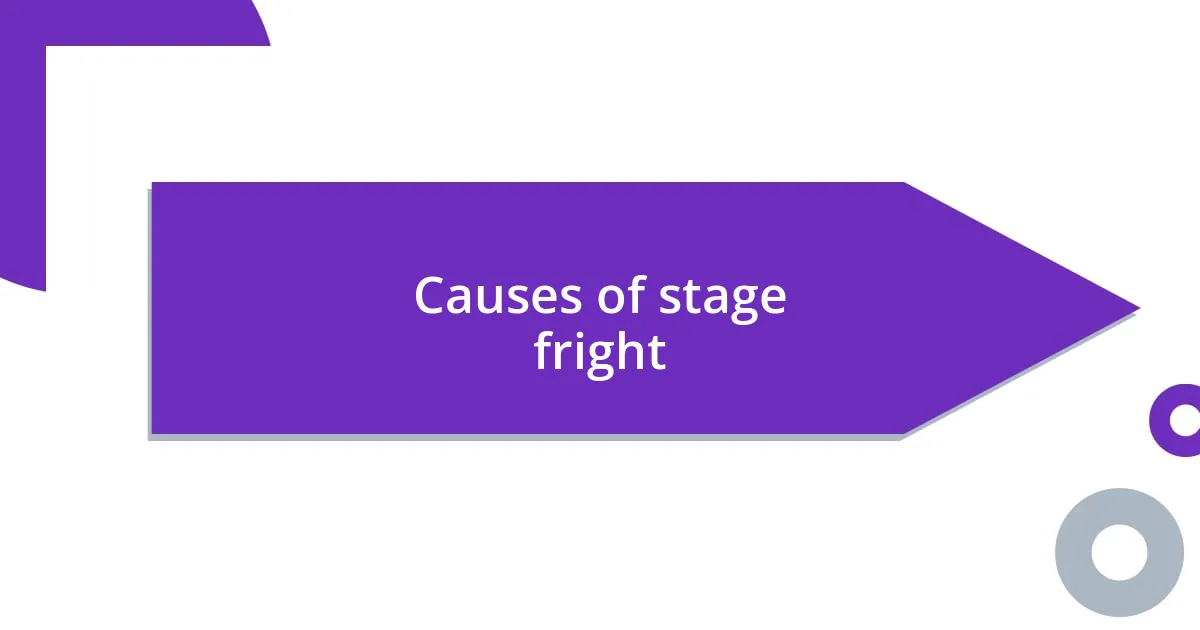
Causes of stage fright
The causes of stage fright often stem from deeply ingrained fears and psychological triggers. One significant factor is the fear of being judged or evaluated by the audience. I recall a presentation where I was convinced that every eye was scrutinizing my every move. The thought alone was enough to send chills down my spine and leave me second-guessing my every word. Doesn’t it feel overwhelming when you think everyone is watching your every mistake?
Another cause can be linked to a lack of preparation or experience. In my earlier days, I often found myself anxious simply because I hadn’t practiced enough. When I remember those sleepless nights spent worrying about my content, it strikes me how preparation can shift the balance from fear to confidence. The more equipped I felt, the more I could channel my nervous energy into delivering a solid performance.
Lastly, physiological responses play a crucial role. Our bodies can react to perceived threats, real or imagined, with symptoms like a racing heart, sweating, or trembling hands. I vividly remember a moment when my hands were shaking so much I could barely hold my notes, which only fueled my anxiety. Have you ever noticed how our physical state can significantly affect our mental state? Understanding these causes can help us tackle stage fright more effectively.
| Cause | Description |
|---|---|
| Fear of Judgment | Concerns about how the audience perceives you. |
| Lack of Preparation | Inadequate practice leading to increased anxiety. |
| Physiological Responses | Physical symptoms triggered by anxiety. |
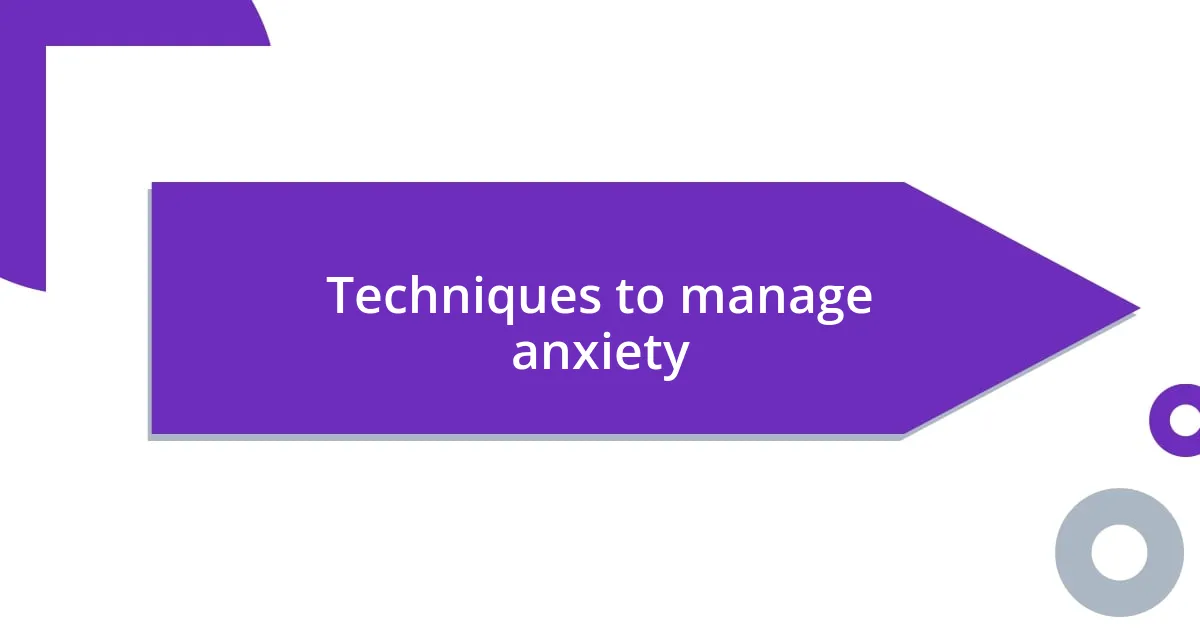
Techniques to manage anxiety
Managing anxiety is a journey that requires both awareness and practical techniques. From my experiences, I’ve discovered that mindfulness and deep breathing can work wonders in calming those jittery nerves. I often take a moment before stepping on stage to inhale deeply and visualize myself delivering a strong performance. This practice helps center my thoughts and reduce the overwhelming feelings of anxiety that can creep in at the last minute.
Here are some techniques that can help manage anxiety effectively:
-
Deep Breathing: Take deep, slow breaths to help lower your heart rate and relax your body. Inhale through your nose for a count of four, hold for four, and exhale through your mouth for a count of four.
-
Visualization: Imagine yourself confidently delivering your speech or performance. This mental rehearsal can create a positive mindset that reduces anxiety.
-
Positive Affirmations: Speak empowering affirmations to yourself, such as “I am prepared,” or “I can do this.” These words can counteract negative self-talk and boost your confidence.
-
Progressive Muscle Relaxation: Gradually tense and relax different muscle groups to release physical tension and calm your mind. Start from your toes and work up to your head.
-
Grounding Techniques: Focus on your surroundings or engage your senses—feel your feet on the ground or notice the sounds around you. This can help anchor you in the present and reduce anxious thoughts.
Incorporating these techniques into my routine has not only helped me manage anxiety but has also contributed to building my overall confidence in public speaking. There’s something comforting about knowing I have tools at my disposal to navigate those anxious moments.
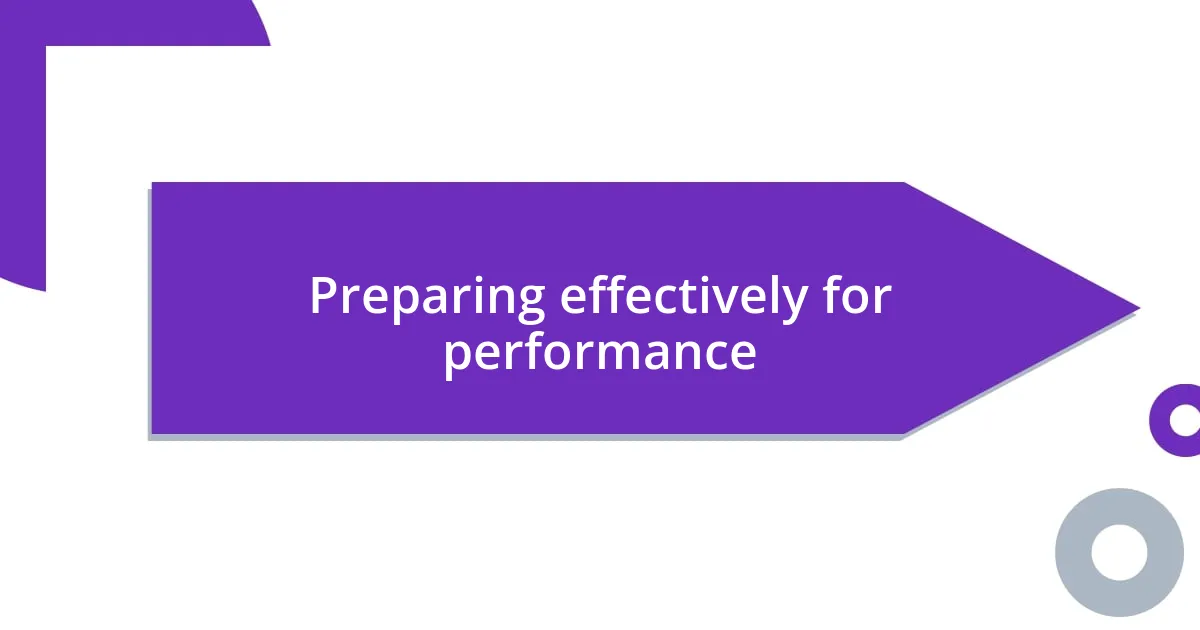
Preparing effectively for performance
When it comes to effectively preparing for a performance, I’ve learned that rehearsal is essential. The first time I had to present in front of a large crowd, I just glanced over my notes a couple of times and thought I’d be fine. Boy, was I wrong! Now I dedicate ample time for practice, running through my material until I can present it smoothly and confidently. Isn’t it amazing how familiarity can ease so much tension?
Creating a mental outline of the key points is another preparation strategy that has worked wonders for me. Recently, before a workshop, I jotted down my main ideas and visualized how each point would connect. This not only helped me organize my thoughts but also allowed me to summon that excitement of sharing knowledge rather than just worrying about speaking. Have you ever noticed how clarity in your message makes you feel more empowered?
I also emphasize the importance of early arrival and warm-up exercises. On one occasion, arriving early allowed me to soak in the stage and get comfortable with the environment. I even took a few minutes to do tongue twisters, which sounds silly but truly helped loosen up my vocal cords. This preparation made me feel like the stage was my second home. Have you explored how a little extra time can transform your performance approach?
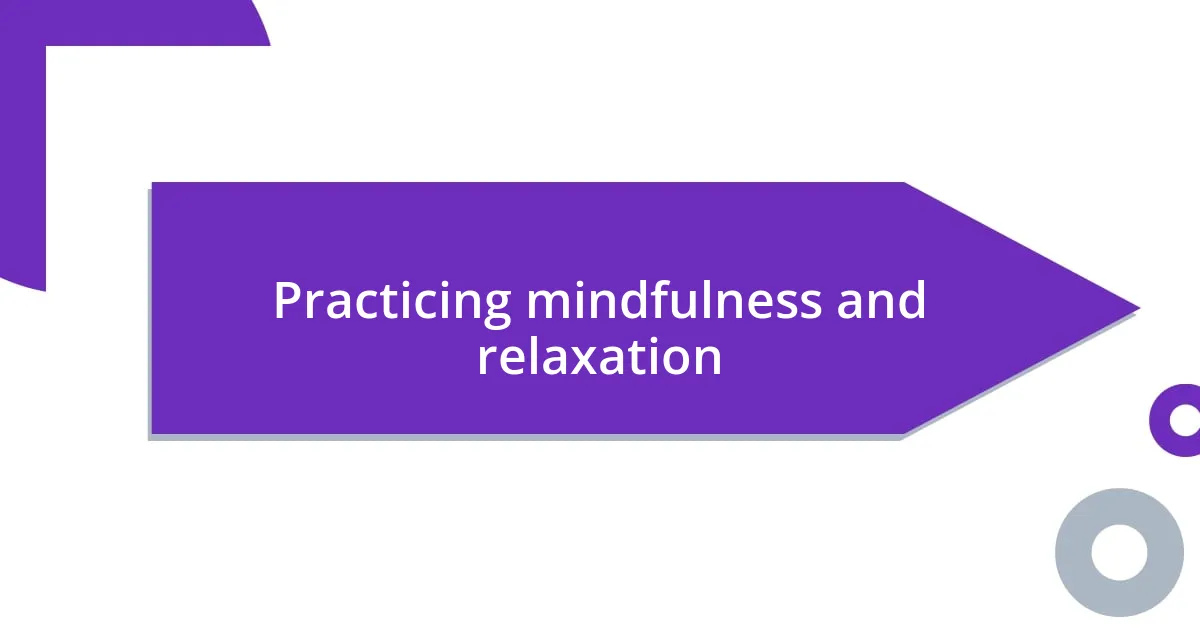
Practicing mindfulness and relaxation
Practicing mindfulness is something I treasure in my routine, especially before a performance. I recall a time when I felt utterly overwhelmed about an upcoming speech. I decided to sit quietly and focus on my breath instead of letting anxiety take the wheel. As I inhaled and exhaled, the tension began to dissolve, transforming those nervous butterflies into a sense of calm focus. Have you ever noticed how just a few mindful moments can shift your perspective so significantly?
In those crucial minutes before stepping onto the stage, I lean into progressive muscle relaxation. I remember feeling my shoulders tighten as the crowd grew louder. By consciously tensing and relaxing my muscles, I could feel the stress melting away, almost like I was peeling off the layers of anxiety. It’s incredible how our bodies hold onto tension, right? Giving myself permission to relax helps me approach my performance with a clearer mind and a more open heart.
Visualizing success has become my secret weapon. Before my last presentation, I imagined myself in the spotlight, the audience engaged and nodding along. This simple mental exercise made me realize the power of positive imagery. As I shared my thoughts, I could still access that vivid mental picture, which made the experience feel less daunting. Don’t you find it fascinating how our minds can be both a source of fear and empowerment?
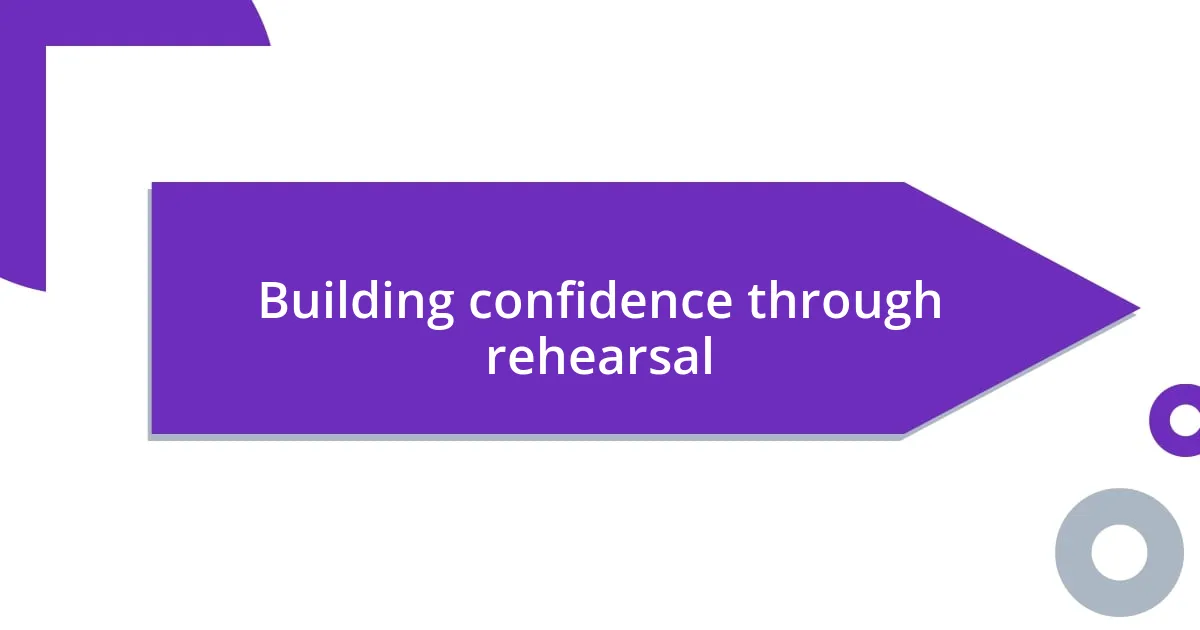
Building confidence through rehearsal
Rehearsal has become my sanctuary for building confidence. I remember a particularly nerve-wracking presentation where I practiced in front of my mirror, embodying my character and nudging out the jitters. There’s something about seeing myself deliver that energy that transforms my anxiety into enthusiasm. Have you ever thought about how practice can change not just your delivery, but your entire mindset?
As I repeat my material, I notice that it becomes second nature. During one rehearsal, I felt liberated when I could focus on connecting with the audience instead of my notes. I realized that the more I practiced, the more I could infuse my personality into the performance. It’s like performing becomes a dance rather than a rigid script. Have you experienced that shift from pressure to passion?
The act of rehearsal often provides unexpected insights. One time, while rehearsing a particular phrase, I stumbled and let out a nervous laugh, which surprisingly drew a sense of warmth from my audience in a later actual performance. This taught me that imperfections can create connections, making my delivery more relatable. Isn’t it intriguing how rehearsal not only prepares you technically but also emotionally?
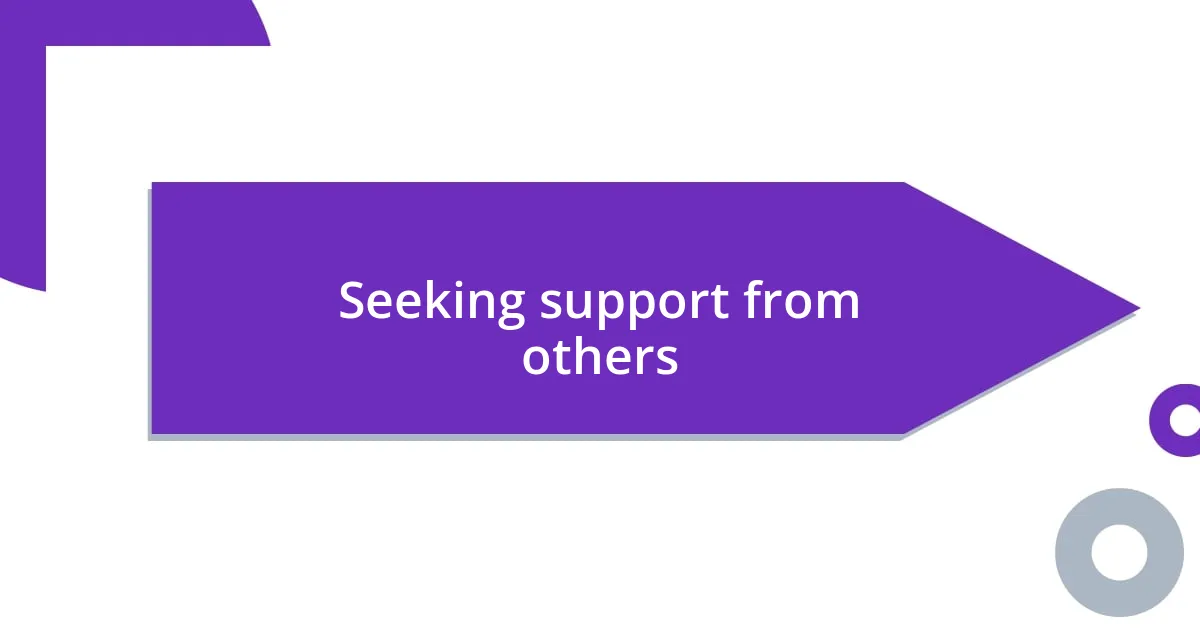
Seeking support from others
When I first grappled with stage fright, I quickly learned the immense value of leaning on others for support. That memorable evening before my first big presentation, I reached out to a close friend who had already navigated similar waters. As we talked, I could feel my anxiety start to dissipate; sharing my fears out loud made them feel less daunting. Have you found that simply voicing your concerns can strip away some of their power?
Talking to support groups or fellow performers has also been a game changer for me. I remember attending a workshop where performers openly shared their battle with stage fright. Hearing their stories helped me realize that I wasn’t alone in my struggle. There’s something comforting about knowing others truly understand what you’re going through. Don’t you think that a shared experience can create a strong bond among performers?
Additionally, I cherish those moments when I get feedback from supportive peers after a rehearsal. After one particularly nerve-wracking session, a colleague praised my passion and energy, which transformed how I viewed myself. That simple affirmation bolstered my confidence immensely. Isn’t it interesting how a few kind words can have such a deep impact, making you feel seen and empowered?







